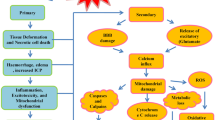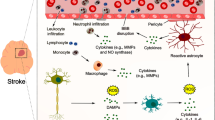Abstract
Increased levels of inflammatory cytokines after traumatic brain injury (TBI) can lead to brain edema and neuronal death. In this study, the effect of melatonin on pro-inflammatory (IL-1ß, IL-6, and TNF-α) and anti-inflammatory (IL-10) cytokines following TBI was investigated considering anti-inflammatory effect of melatonin. Male Wistar rats were divided into five groups: Sham, TBI, TBI + VEH (vehicle), TBI + 5 mg dose of melatonin (MEL5), TBI + 20 mg dose of melatonin (MEL20). Diffuse TBI was induced by Marmarou method. Melatonin was administered 1, 24, 48 and 72 h after TBI through i.p. Brain water content and brain levels of pro-inflammatory (IL-1ß, IL-6 and TNF-α) and anti-inflammatory (IL-10) cytokines were measured 72 h after TBI. The IL-1ß levels decreased in the TBI + MEL5 and TBI + MEL20 groups in comparison to TBI + VEH group (p < 0.001). The levels of IL-6 and TNF-α also decreased in melatonin-treated groups compared to control group (p < 0.001). The amount of IL-10 decreased after TBI. But melatonin administration increased the IL-10 levels in comparison with TBI + VEH group (p < 0.001). The results showed that melatonin administration affected the brain levels of pro-inflammatory and anti-inflammatory cytokines involving in brain edema led to neuronal protection after TBI.




Similar content being viewed by others
References
Calabrese V, Boyd-Kimball D, Scapagnini G, Butterfield DA (2004) Nitric oxide and cellular stress response in brain aging and neurodegenerative disorders: the role of vitagenes. In vivo 18:245–268
Campbell IL, Abraham CR, Masliah E, Kemper P, Inglis JD, Oldstone M, Mucke L (1993) Neurologic disease induced in transgenic mice by cerebral overexpression of interleukin 6. Proc Natl Acad Sci 90:10061–10065
Carrillo-Vico A, Lardone PJ, Naji L, Fernández-Santos JM, Martín-Lacave I, Guerrero JM, Calvo JR (2005) Beneficial pleiotropic actions of melatonin in an experimental model of septic shock in mice: regulation of pro-/anti-inflammatory cytokine network, protection against oxidative damage and anti-apoptotic effects. J Pineal Res 39:400–408
Cederberg D, Siesjö P (2010) What has inflammation to do with traumatic brain injury? Child’s Nerv Syst 26:221–226
Chio CC, Lin JW, Chang MW, Wang CC, Kuo JR, Yang CZ, Chang CP (2010) Therapeutic evaluation of etanercept in a model of traumatic brain injury. J Neurochem 115:921–929
Clausen F, Hånell A, Björk M, Hillered L, Mir AK, Gram H, Marklund N (2009) Neutralization of interleukin-1β modifies the inflammatory response and improves histological and cognitive outcome following traumatic brain injury in mice. Eur J Neurosci 30:385–396
Clausen F et al (2011) Neutralization of interleukin-1β reduces cerebral edema and tissue loss and improves late cognitive outcome following traumatic brain injury in mice. Eur J Neurosci 34:110–123
Costantino G, Cuzzocrea S, Mazzon E, Caputi AP (1998) Protective effects of melatonin in zymosan-activated plasma-induced paw inflammation. Eur J Pharmacol 363:57–63
Cuesta S, Kireev R, García C, Forman K, Escames G, Vara E, Tresguerres JA (2011) Beneficial effect of melatonin treatment on inflammation, apoptosis and oxidative stress on pancreas of a senescence accelerated mice model. Mech Ageing Dev 132:573–582
Cuzzocrea S, Zingarelli B, Gilad E, Hake P, Salzman AL, Szabo C (1997) Protective effect of melatonin in carrageenan-induced models of local inflammation: relationship to its inhibitory effect on nitric oxide production and its peroxynitrite scavenging activity. J Pineal Res 23:106–116
Dehghan F, Hadad MK, Asadikram G, Najafipour H, Shahrokhi N (2013) Effect of melatonin on intracranial pressure and brain edema following traumatic brain injury: role of oxidative stresses. Arch Med Res 44:251–258
Elmarakby AA, Sullivan JC (2012) Relationship between oxidative stress and inflammatory cytokines in diabetic nephropathy. Cardiovasc Ther 30:49–59
Esposito E, Cuzzocrea S (2010) Antiinflammatory activity of melatonin in central nervous system. Curr Neuropharmacol 8:228
Esposito E, Genovese T, Caminiti R, Bramanti P, Meli R, Cuzzocrea S (2008) Melatonin regulates matrix metalloproteinases after traumatic experimental spinal cord injury. J Pineal Res 45:149–156
Genovese T et al (2007) Effects of combination of melatonin and dexamethasone on secondary injury in an experimental mice model of spinal cord trauma. J Pineal Res 43:140–153
Gutierrez-Cuesta J et al (2007) Chronic administration of melatonin reduces cerebral injury biomarkers in SAMP8. J Pineal Res 42:394–402
Hayakata T et al (2004) Changes in CSF S100B and cytokine concentrations in early-phase severe traumatic brain injury. Shock 22:102–107
He J, Evans C-O, Hoffman SW, Oyesiku NM, Stein DG (2004) Progesterone and allopregnanolone reduce inflammatory cytokines after traumatic brain injury. Exp Neurol 189:404–412
Hill CS, Coleman MP, Menon DK (2016) Traumatic axonal injury: mechanisms and translational opportunities. Trends Neurosci 39:311–324
Khaksari M, Soltani Z, Shahrokhi N, Moshtaghi GA (2011) The role of estrogen and progesterone, administered alone and in combination, in modulating cytokine concentration following traumatic brain injury. Can J Physiol Pharmacol 89:31–40
Khaksari M, Abbasloo E, Dehghan F, Soltani Z, Asadikaram G (2015) The brain cytokine levels are modulated by estrogen following traumatic brain injury: which estrogen receptor serves as modulator? Int Immunopharmacol 28:279–287
Khuman J et al (2010) Tumor necrosis factor alpha and Fas receptor contribute to cognitive deficits independent of cell death after concussive traumatic brain injury in mice. J Cereb Blood Flow Metab 31:778–789
Korkmaz A, Reiter RJ, Topal T, Manchester LC, Oter S, Tan D-X (2009) Melatonin: an established antioxidant worthy of use in clinical trials. Mol Med 15:43–50
Kumar A, Loane DJ (2012) Neuroinflammation after traumatic brain injury: opportunities for therapeutic intervention. Brain Behav Immun 26(8):1191–1201
Lu KT, Wang YW, Yang JT, Yang YL, Chen HI (2005) Effect of interleukin-1 on traumatic brain injury-induced damage to hippocampal neurons. J Neurotrauma 22:885–895
Marmarou A, Foda MAAE, Brink W, Campbell J, Kita H, Demetriadou K (1994) A new model of diffuse brain injury in rats. J Neurosurg 80:291–300
Martín V, Sainz RM, Antolín I, Mayo JC, Herrera F, Rodríguez C (2002) Several antioxidant pathways are involved in astrocyte protection by melatonin. J Pineal Res 33:204–212
Mauriz JL, Collado PS, Veneroso C, Reiter RJ, González-Gallego J (2013) A review of the molecular aspects of melatonin’s anti-inflammatory actions: recent insights and new perspectives. J Pineal Res 54:1–14
Mayo JC, Sainz RM, Tan D-X, Hardeland R, Leon J, Rodriguez C, Reiter RJ (2005) Anti-inflammatory actions of melatonin and its metabolites, N1-acetyl-N2-formyl-5-methoxykynuramine (AFMK) and N1-acetyl-5-methoxykynuramine (AMK), in macrophages. J Neuroimmunol 165:139–149
Mofid B et al (2016) What are the progesterone-induced changes of the outcome and the serum markers of injury, oxidant activity and inflammation in diffuse axonal injury patients? Int Immunopharmacol 32:103–110
Mota BC et al (2012a) Exercise pre-conditioning reduces brain inflammation and protects against toxicity induced by traumatic brain injury: behavioral and neurochemical approach. Neurotox Res 21:175–184
Mota BC et al (2012b) Exercise pre-conditioning reduces brain inflammation and protects against toxicity induced by traumatic brain injury: behavioral and neurochemical approach. Neurotox Res 21:175–184
Murray KN, Parry-Jones AR, Allan SM (2015) Interleukin-1 and acute brain injury. Front Cell Neurosci 9:18
Naseem M, Parvez S (2014) Role of melatonin in traumatic brain injury and spinal cord injury. Sci World J. https://doi.org/10.1155/2014/586270
Okie S (2005) Traumatic brain injury in the war zone. N Engl J Med 352:2043–2047
Olcese JM et al (2009) Protection against cognitive deficits and markers of neurodegeneration by long-term oral administration of melatonin in a transgenic model of Alzheimer disease. J Pineal Res 47:82–96
Ozdemir D et al (2005a) Protective effect of melatonin against head trauma-induced hippocampal damage and spatial memory deficits in immature rats. Neurosci Lett 385:234–239
Ozdemir D et al (2005b) Effect of melatonin on brain oxidative damage induced by traumatic brain injury in immature rats. Physiol Res 54:631
Park JW, Hwang MS, Suh SI, Baek WK (2009) Melatonin down-regulates HIF-1α expression through inhibition of protein translation in prostate cancer cells. J Pineal Res 46:415–421
Permpoonputtana K, Govitrapong P (2012) The anti-inflammatory effect of melatonin on methamphetamine-induced proinflammatory mediators in human neuroblastoma dopamine SH-SY5Y cell lines. Neurotox Res 23:1–11
Pinteaux E, Trotter P, Simi A (2009) Cell-specific and concentration-dependent actions of interleukin-1 in acute brain inflammation. Cytokine 45:1–7
Pozo D, Reiter RJ, Calvo JR, Guerrero JM (1997) Inhibition of cerebellar nitric oxide synthase and cyclic GMP production by melatonin via complex formation with calmodulin. J Cell Biochem 65:430–442
Reiter RJ, Tan D, Osuna C, Gitto E (2000) Actions of melatonin in the reduction of oxidative stress. J Biomed Sci 7:444–458
Sarkaki AR, Khaksari Haddad M, Soltani Z, Shahrokhi N, Mahmoodi M (2013) Time-and dose-dependent neuroprotective effects of sex steroid hormones on inflammatory cytokines after a traumatic brain injury. J Neurotrauma 30:47–54
Schmidt OI, Heyde CE, Ertel W, Stahel PF (2005) Closed head injury—an inflammatory disease? Brain Res Rev 48:388–399
Shiozaki T et al (2005) Cerebrospinal fluid concentrations of anti-inflammatory mediators in early-phase severe traumatic brain injury. Shock 23:406–410
Shlosberg D, Benifla M, Kaufer D, Friedman A (2010) Blood–brain barrier breakdown as a therapeutic target in traumatic brain injury. Nat Rev Neurology 6:393–403
Soltani Z, Khaksari M, Shahrokhi N, Mohammadi G, Mofid B, Vaziri A, Amiresmaili S (2016) Effect of estrogen and/or progesterone administration on traumatic brain injury-caused brain edema: the changes of aquaporin-4 and interleukin-6. J Physiol Biochem 72:33–44
Taupin V, Toulmond S, Serrano A, Benavides J, Zavala F (1993) Increase in IL-6, IL-1 and TNF levels in rat brain following traumatic lesion: influence of pre- and post-traumatic treatment with Ro5 4864, a peripheral-type (p site) benzodiazepine ligand. J Neuroimmunol 42(2):177–185
Veneroso C, Tuñón MJ, González-Gallego J, Collado PS (2009) Melatonin reduces cardiac inflammatory injury induced by acute exercise. J Pineal Res 47:184–191
Vink R, Young A, Bennett C, Hu X, Connor C, Cernak I, Nimmo A (2003) Neuropeptide release influences brain edema formation after diffuse traumatic brain injury. Brain Edema XII. Springer, Berlin, pp 257–260
Wajant H, Pfizenmaier K, Scheurich P (2003) Tumor necrosis factor signaling. Cell Death Differ 10:45–65
Acknowledgements
The present study was supported by the Neuroscience Research Centre in Kerman University of Medical Sciences.
Author information
Authors and Affiliations
Corresponding author
Rights and permissions
About this article
Cite this article
Dehghan, F., Shahrokhi, N., Khaksari, M. et al. Does the administration of melatonin during post-traumatic brain injury affect cytokine levels?. Inflammopharmacol 26, 1017–1023 (2018). https://doi.org/10.1007/s10787-017-0417-1
Received:
Accepted:
Published:
Issue Date:
DOI: https://doi.org/10.1007/s10787-017-0417-1




